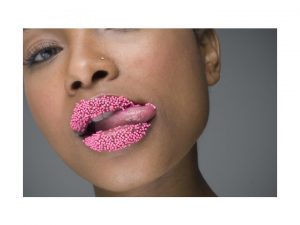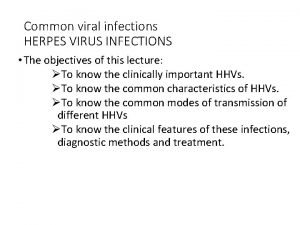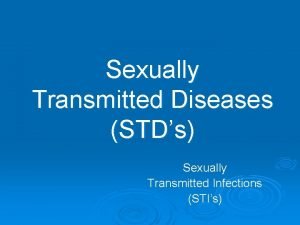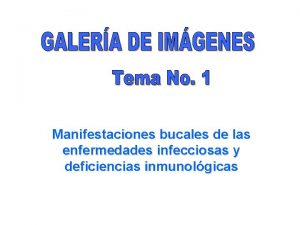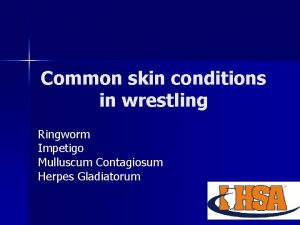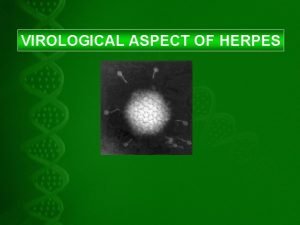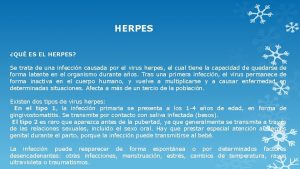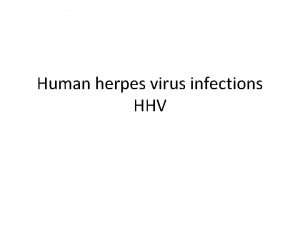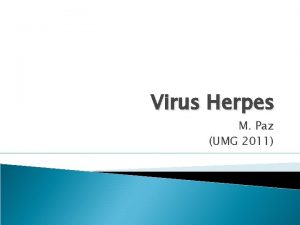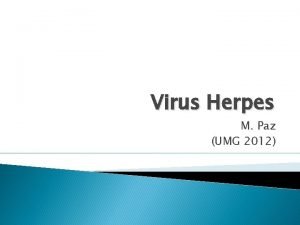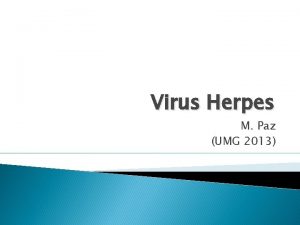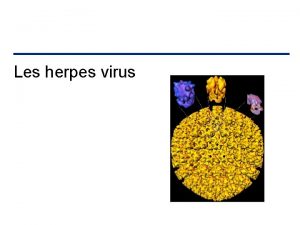Herpes for Life MCFALLS Angela Louise MCGEHEE Melissa
























- Slides: 24

Herpes for Life? MCFALLS, Angela Louise MCGEHEE, Melissa Jauncey MCKITTRICK, Tara Nicole MEETZE, Kristin Leigh CRECILIUS, Ryan

What is Herpes? o o There are more than 80 known types of the herpes virus, but only 8 are known to cause diseases in humans Genital Herpes is a contagious viral infection that affects both men and women. It is spread through close physical, skin-to-skin contact and causes periodic outbreaks that may appear as painful, itchy clusters of blisters, bumps and rashes in the genital area. It is caused by the herpes simplex virus-2 (HSV-2) one of the several forms of the Herpes Simplex virus which also causes Chicken Pox, Shingles, mononucleosis, and oral herpes (HSV-1) Both HSV Type 1 and Type 2 can cause genital Herpes and both can be contracted orally.

What is Herpes? … continued o o Most individuals have no or only minimal signs or symptoms from HSV-1 or HSV-2 infection. When signs do occur, they typically appear as one or more blisters on or around the genitals or rectum. The blisters break, leaving tender ulcers (sores) that may take two to four weeks to heal the first time they occur. Typically, another outbreak can appear weeks or months after the first, but it almost always is less severe and shorter than the first outbreaks. Although the infection can stay in the body indefinitely, the number of outbreaks tends to decrease over a period of years.

Type 1 vs. Type 2 o o The difference between the two types of HSV is in their site of preference. HSV-1 usually is found in the trigeminal ganglion, a collection of nerve cells near the ear. From there is tends to appear on the lower lip or face. HSV-2 usually makes its home in the sacral ganglion at the base of the spine and tends to reoccur in the genital area. Most people are not aware that both types can be spread to the genitals and therefore causing the idea that one is worse than the other, when in fact they are very similar.

History o o Herpes Virus Infections have been prevalent as early as ancient Greek times. Hippocrates is known to have described the spreading of herpes simplex lesions. Scholars of Greek civilization define the Greek word “herpes” to mean to “creep” or “crawl describing the nature of the herpes ability to spread. Herpes may have also been documented in the works of Shakespeare. In Romeo and Juliet, he writes Queen Mab to say "O'er ladies lips, who straight on kisses dream, which oft the angry Mab with blisters plagues, because their breaths with sweetmeats tainted are. " It was not until 1893 that the Herpes virus was documented as being transmitted from one person to another.

Symptoms o o o The most common symptoms of herpes is a cluster of small fluid-filled blisters that break, forming painful sores that crust and heal over the course of several days. Some people only experience a rash or small bumps on the skin that may just appear to be pimples or ingrown hairs. Some people have painful urination and some women have fluid discharge from the vagina. Sores may appear four to seven days after the person is infected, or not until years later, which is why tracing the source of an infection can be very difficult in people with multiple partners. Flu-like symptoms including fever and swollen lymph glands in the groin can also occur.

Diagnosis & Treatment of Herpes o o Health care providers can diagnose genital herpes by visual inspection if the outbreak is typical, and by taking a sample from the sore or sores and testing it in a lab. HSV infections may be difficult to diagnose between outbreaks. Blood tests, which detect HSV-1 or HSV-2 infection, may help, but the results are not always direct. There is no cure for herpes, but taking antiviral medications can shorten and prevent outbreaks.

Suppression and Treatments Although there is no “cure” for Herpes, there are many ways to help suppress it, and minimize outbreaks o o Anti- Viral Medications such as acyclovir (Valtrex) Famvir (a more aggressive form of acyclovir) Vitamins C, E, B Complex, and beta carotene Herbal supplements such as atragalus, echinacea, and red algae have also been linked to help to suppress and help treat herpes -But there still is no Cure

Reoccurrences o o HSV-2 can be known to outbreak many times a year. The number of outbreaks a person experiences can be largely influenced by the person’s ability of the immune system to fight off the virus. Time can be a factor in the amount of outbreaks too. Over time the number of outbreaks a person experiences decrease. HSV-1 and HSV-2 have more reoccurrences when they are caught in their site of preference. For example, if a person is to catch HSV-1 in the genitals, the chances of reoccurring are much more unlikely than having genital HSV-2. In fact some people only experience one outbreak at all in this scenario. There is still a chance for the person to pass the virus. Other things that can cause outbreaks include surgery, illness, stress, fatigue, skin irritation (such as sunburn), diet, menstruation, or vigorous sexual intercourse.

Transmission o o Transmission is caused by close oral, anal, or genital contact, including intercourse, masturbation, kissing, or any direct skinto-skin contact, which allows for the transfer of bodily fluids A person with the virus is most contagious when sores are present and healing. Spreading is possible when a person shows no signs of HSV because of viral spreading called asymptomatic transmission. This is why people who have the virus but have never had on outbreak are able to spread the virus unknowingly to their partners.

The Complications of Herpes n Along with the painful genital sores, Herpes can cause many other problems such as: o Psychological distress o HSV can cause death in babies if the mother has sores at the time of birth o Herpes can make people more prone to catching and spreading the HIV virus, due to the sores being considered an “open wound”

How Common is Herpes? o o Nationally representative studies study show that genital herpes infection is common in the United States. All over the country, at least 45 million people above the age of 12, or one out of five adolescents and adults, have had genital HSV infection. Between the late 1970 s and the early 1990 s, the number of Americans with genital herpes infection increased 30%. HSV-2 infection is usually more common in women (approximately one out of four women) than in men (almost one out of five). This may be due to male-to-female transmissions being more efficient than female-to-male transmission.

Statistics… o o o In a recent study to gather genital herpes statistics, a nationally representative study show that genital herpes infection is very common in the United States. Nationwide, 45 million people ages 12 and older, or one out of five (possibly as many as 1 in 4) of the total adolescent and adult population, are infected with HSV-2. When taking genital herpes statistics into account, look around you at any given time and recognize based on the genital herpes statistics just how many people are likely to have the virus. HSV-2 infection is more common in women (approximately one out of four women) than in men (almost one out of five). This is according to the same genital herpes statistics research. This may be due to male-to-female transmission being more efficient than female-to-male transmission.

Statistics (continued) o o HSV-2 infection has also been found to be more common in blacks (45. 9%) than in whites (17. 6%). Race and ethnicity in the United States correlate with other, more fundamental determinants of health such as poverty, access to good quality health care, behavior for seeking health care, illicit drug use, and living in communities with a high prevalence of STDs. Ongoing genital herpes statistics research since the late 1970 s, indicate the number of Americans with genital herpes infection has increased 30%. The largest increase is currently occurring in young white teens. HSV-2 infection is now five times more common in 12 - to 19 -year-old whites, and it is twice as common in young adults ages 20 to 29 than it was 20 years ago.

Living With Herpes: What You Need To Know o Prevent Spreading o Promote Healing o Stay Healthy o Seek Support o Keep Relationships Strong

Prevent Spreading o o Don't touch the sore, and if you accidentally touch it, be sure to wash your hands with soap and water. Take extra care not to touch your eyes, nose, mouth, or genitals after touching sores, as these areas are particularly sensitive to herpes infection. Refrain from physical skin-to-skin contact, including oral, vaginal, and anal sex during a genital herpes outbreak. Make sure your sores don't come into contact with another person's skin. Of course, during a genital herpes outbreak, you can still express your feelings through hugging, kissing, and cuddling. (Remember, if you have a cold sore, you should not kiss another person. )

Prevent Spreading continued… o Use condoms even between outbreaks to help reduce the risk of spreading the herpes virus. You can still spread the virus to others when you don't have a visible outbreak. Be aware that condoms may not cover all the areas where the herpes virus may be present, so they aren't 100% effective in preventing the spread of genital herpes. Some people believe spermicides, when used with condoms, are another way of reducing the risk of spreading genital herpes. Keep in mind that, while spermicides have been shown to kill viruses and bacteria that cause some sexually transmitted diseases (STDs), they have not been proven to reduce the risk of spreading the herpes virus. o Get tested for other STDs. Even if your partner also has genital herpes, you should know everything about his or her sexual health. o Learn all you can about genital herpes, and discuss what you learn with your partner.

Promote Healing o o o Keep your herpes sores clean and dry. Take warm baths and, after each bath, dry your sores well. Some people use a hair dryer set to an "air only" setting. Wear loose clothes that don't rub or irritate your sores. Cotton underwear is best, and don't wear pantyhose if you don't have to. Apply ice packs to your sores. You may find this relieves some of the swelling and discomfort.

Stay Healthy o Get eight or more hours of sleep each night. o Eat a sensible, well-balanced diet. o Avoid alcohol, or use it only in moderation. o Don't smoke or use recreational drugs. o o Exercise when you can, and ask your doctor about a good exercise program. Try to minimize stress at work and at home.

Keep Relationships Strong o Keep it in perspective. It's normal to be anxious about genital herpes, but try not to withdraw from friends or intimate relationships because you're embarrassed. Don't risk cutting yourself off from the emotional support you need.

Keep Relationships Strong cont… o Communicate openly. Talking about genital herpes with someone you love and trust can be hard at first. You may fear telling a romantic partner because you're afraid of rejection. Experts say the best approach is to think through what you are going to say—perhaps even rehearse it—and then say it in a direct, honest, and upbeat way.

Keep Relationships Strong cont… o Take precautions. Always practice safer sex, even if you've been in the same relationship for a very long time. Condoms can help reduce the risk of spreading the herpes virus between partners.

Seek Support o Talking with an understanding partner, friend, family member, or counselor about genital herpes can help reduce your anxiety and stress. You may even want to consider joining a herpes support group.

Works Cited q q q www. cdc. gov/std/Herpes/STDFact-Herpes. htm www. forces-ofnature. net/herpes/genital_herpes_statistics. htm www. genitalherpes. com www. herpes-foundation. org www. herpes. org www. stdservices. on. net USA Today Magazine, Feb 2004, Vol. 132 Issue 2705, p 12, 1 p TB and Outbreaks Week: 1/20/2004, p 21, 2 p Lancet: 1/10/2004, Vol. 363 Issue 9403, p 137, 1 p Women's Health Weekly, 10/2/2003, p 56, 2 p
 Angela louise
Angela louise Herpes og graviditet
Herpes og graviditet Historia natural del herpes labial
Historia natural del herpes labial Herpes zoster clasificacion
Herpes zoster clasificacion Herpes simpleksserotipe 2
Herpes simpleksserotipe 2 Herpes simpleksserotipe 2
Herpes simpleksserotipe 2 Tempat berkembangnya janin
Tempat berkembangnya janin Corrimento na gravidez
Corrimento na gravidez Keratoconjunctivitis
Keratoconjunctivitis Genial herpes
Genial herpes Herpes rugbiorum
Herpes rugbiorum Que es diagnostico diferencial
Que es diagnostico diferencial Herpes simplex virus
Herpes simplex virus Glositis intersticial
Glositis intersticial Gingivostomatita herpetica
Gingivostomatita herpetica How to mix shingrix vaccine
How to mix shingrix vaccine Iridocyctitis
Iridocyctitis Mulluscum contagiosum
Mulluscum contagiosum Herpes genital tratamento definitivo
Herpes genital tratamento definitivo Faringite
Faringite Human herpesvirus 2
Human herpesvirus 2 Herpes zoster
Herpes zoster Aciclovir varicela copii
Aciclovir varicela copii Virus herpes simplex de type 2
Virus herpes simplex de type 2 Gonorrea
Gonorrea
